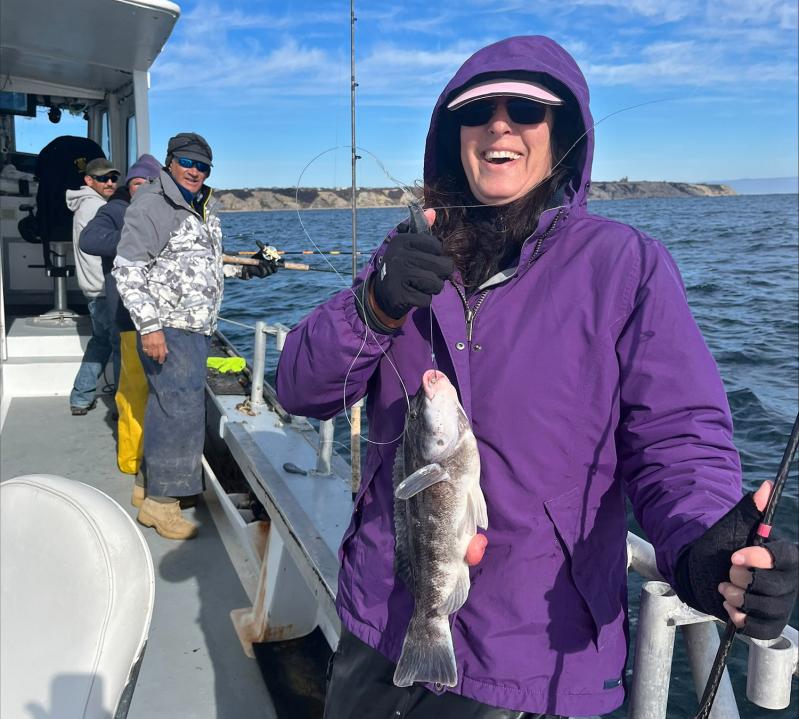As we move deeper into November, it has become a challenge to find days that are fishable. As is common this time of year, windy weather has been a frequent occurrence and has postponed many planned outings on the water.
On Sunday morning, the wind fan was still turned on as I joined the East Hampton Sportsmen’s Alliance on its final fishing excursion of the year. The winds, which gusted to over 20 knots from the north, were supposed to die down as the morning went on. Fingers were crossed that the forecast was accurate.
Once again, we were on the Elizabeth II, a roomy 46-foot, Young Brothers-built charter boat that’s skippered by Capt. Paul Bruno. We arrived a bit past 5 a.m. at the Montauk Marine Basin, and the air temperature was downright cold — about 34 degrees. The wind chill made it feel closer to 20. Brr.
All eight of us aboard were wearing our heaviest of winter gear, including gloves, wool hats, insulated socks, and waterproof boots. Most of us resembled the chunky Pillsbury Doughboy. Appearances aside, we were still all happy to be aboard.
The heater was thankfully on full blast in the main cabin, where Bruno was sitting in his helm chair. “A bit frosty isn’t it?” he said as we shook hands. I couldn’t argue with him; I could barely feel my toes.
Bruno’s game plan was to take us on a 90-minute ride to Block Island for blackfish, sea bass, and codfish. When boats were able to get out in recent days, the action was good, especially for blackfish.
For background, the Narragansett people were the first inhabitants of Block Island as evidenced by remains that date back thousands of years. They called the island Manisses, which translates to “Island of the Little God.” I’m not sure who the Big God was, but I’m sure he was quite impressive.
Giovanni da Verrazzano was the first European to note Block Island’s existence back in 1524. However, Block Island was named after Adriaen Block, the Dutch navigator who found it again in 1614.
Sixteen families from the English colony of Massachusetts settled on Block Island in 1661, and in 1664 the Island became part of the English colony of Rhode Island. Today, the beautiful island has a population of around 1,400 residents, and tourism, along with great fishing, are its main claims to fame.
Laughter filled the cabin for much of our ride off to the east. Ilissa Meyer, who once again coordinated the trip, made sure that each of us was well taken care of all day with a large plastic bag of her own delicious version of chicken McNuggets. Meyer, who is blessed with a warm smile and great sense of humor, made sure that none of us would starve that day.
As we approached the south side of Block Island under the majestic 200-foot Mohegan Bluffs, Bruno lowered the anchor. It was finally time to fish.
While the breeze eventually began to die down a few hours later, we all plucked away at a consistent blackfish bite that ran in flurries. A few nice sea bass were also landed, as well as two codfish. We had a great day. Mission accomplished.
Our ride back to Montauk was beautiful in the late fall sun. The winds were no longer an issue and the seas were calm. Our leader, Ilissa, took a well-deserved snooze in the forward lower berth.
Sadly, she and her husband will soon relocate to near Ithaca in upstate New York. But she has vowed to continue to coordinate and man the rails on our future trips, continuing a nearly 15-year tradition. A trip on the Elizabeth II would not be the same without her.
Back on land, at Mrs. Sam’s Bait and Tackle in East Hampton, the proprietor, Sebastian Gorgone, said, “Squid is the word!” He reported that “the squid are still thick out here.” By way of confirmation, Capt. Bruno caught a bushel basket of the tasty cephalopods in Fort Pond Bay the day before our charter. Fried calamari, anyone?
Gorgone added that blackfish are being landed off Gull Island off to the north, and that schoolie-size striped bass remain plentiful for casters in the ocean suds.
With Thanksgiving around the corner, Capt. Harvey Bennett is giving thanks to the donations of baseball equipment he has received, including bats, balls, and gloves, that he will shortly send to underprivileged children in Cuba.
“I really could use some more stuff before I box things up,” said the former owner of the Tackle Shop in Amagansett. “I hope people will take the time to look for stuff in their garage, closets, or basement. But I’m also happy to accept new equipment too.”
To coordinate a drop-off, Bennett can be reached at 631-324-7770 or by email at [email protected].
—
Fishing tips, observations, and photographs can be sent to [email protected].

